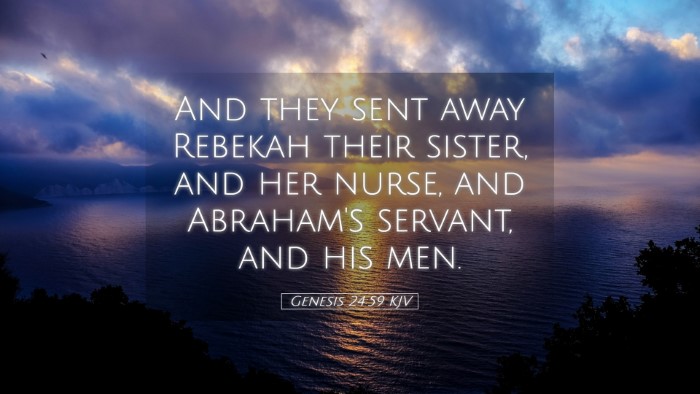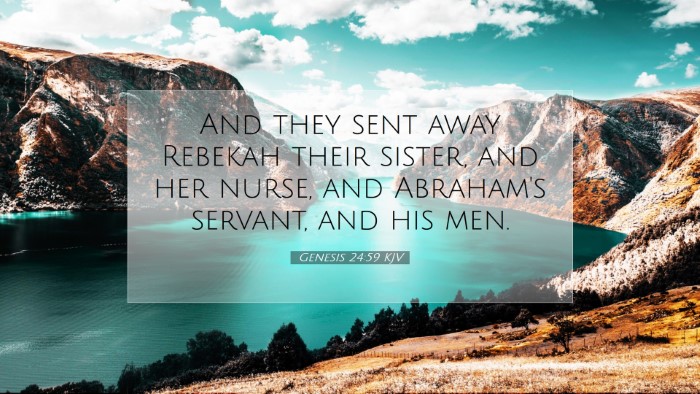Commentary on Genesis 24:59
Genesis 24:59 reads: “And they sent away Rebekah their sister, and her nurse, and Abraham's servant, and his men.” This verse concludes the details surrounding the courtship of Isaac and Rebekah, a pivotal moment in the Abrahamic narrative. In considering this verse, we will draw insights from notable public domain commentaries, which together shed light on the cultural, theological, and narrative implications of this event.
Historical and Cultural Context
In the ancient Near Eastern culture, marriage was not merely a personal affair but a significant social and familial union. Rebekah's departure signifies not just a personal choice but a family decision that reflects the customs of the time.
Matthew Henry notes the importance of the family in this context, highlighting that Rebekah's choice to leave highlights her faith and willingness to embrace the covenant community of Abraham, aligning herself with God's promises. The sending away of her nurse along with her is indicative of the close ties she had with her family and the honor they bestowed upon her by sending someone familiar to guide and serve her in this new phase of life.
The Role of the Servant
When considering the figure of Abraham's servant, it is vital to recognize his role as a spiritual facilitator. Albert Barnes emphasizes the servant's humility and obedience throughout the narrative. He diligently sought the Lord’s guidance and was instrumental in bringing Rebekah into the covenant family.
As mentioned in the commentary, the servant’s commitment to his mission exemplifies the ideal attitude of a believer. He was a mediator, showcasing qualities such as faithfulness and dedication, making him a type of Christ who is sent to seek a bride for the Son.
The Significance of Rebekah's Departure
The act of sending Rebekah away encapsulates themes of faith, providence, and covenant loyalty. Adam Clarke draws attention to the spiritual significance of her leaving, likening it to a believer's call to leave behind the old life for a new one in Christ.
Rebekah’s decision reflects her faith in a promise she had not yet fully understood. Her willingness to leave her family and homeland not only denotes personal sacrifice but also a deep trust in God’s leading, aligning with the overarching narrative of faith throughout Genesis.
The Nurse – A Symbol of Transition
The presence of Rebekah's nurse is not simply a cultural detail but a significant transition. As they send her away with Rebekah, it indicates a supportive role and an understanding of the journey she is about to undertake. Henry mentions that the nurse represents the connection to her upbringing and a reminder of her heritage, acting as a comforting presence in this uncertain time.
Theological Reflections
This verse not only holds historical importance but also resonates with significant theological implications. The act of leaving home embodies a spiritual journey every believer undertakes. The prospect of entering into a new covenant relationship, as symbolized by Rebekah’s marriage to Isaac, mirrors the pursuit of a relationship with Christ.
In conclusion, Genesis 24:59 encapsulates a moment rife with cultural, historical, and theological richness. It navigates the complexities of family, faith, and transition while underscoring God's sovereignty in the fulfillment of His promises. The insights from Matthew Henry, Albert Barnes, and Adam Clarke provide a multifaceted understanding that is beneficial for pastors, students, theologians, and scholars alike.
Application for Today
- Faith and Trust: Just as Rebekah trusted the unknown, believers today are called to exercise faith in God’s plans for their lives.
- Community and Support: The sending of Rebekah’s nurse reminds us of the importance of community in facilitating life transitions.
- God’s Providence: The orchestrating of events in Rebekah’s life points to God’s providential hand in guiding us toward our destinies.
- Covenantal Relationships: Like Rebekah’s entry into Isaac’s life, our spiritual journeys lead us into deeper relationships under God’s covenant.


